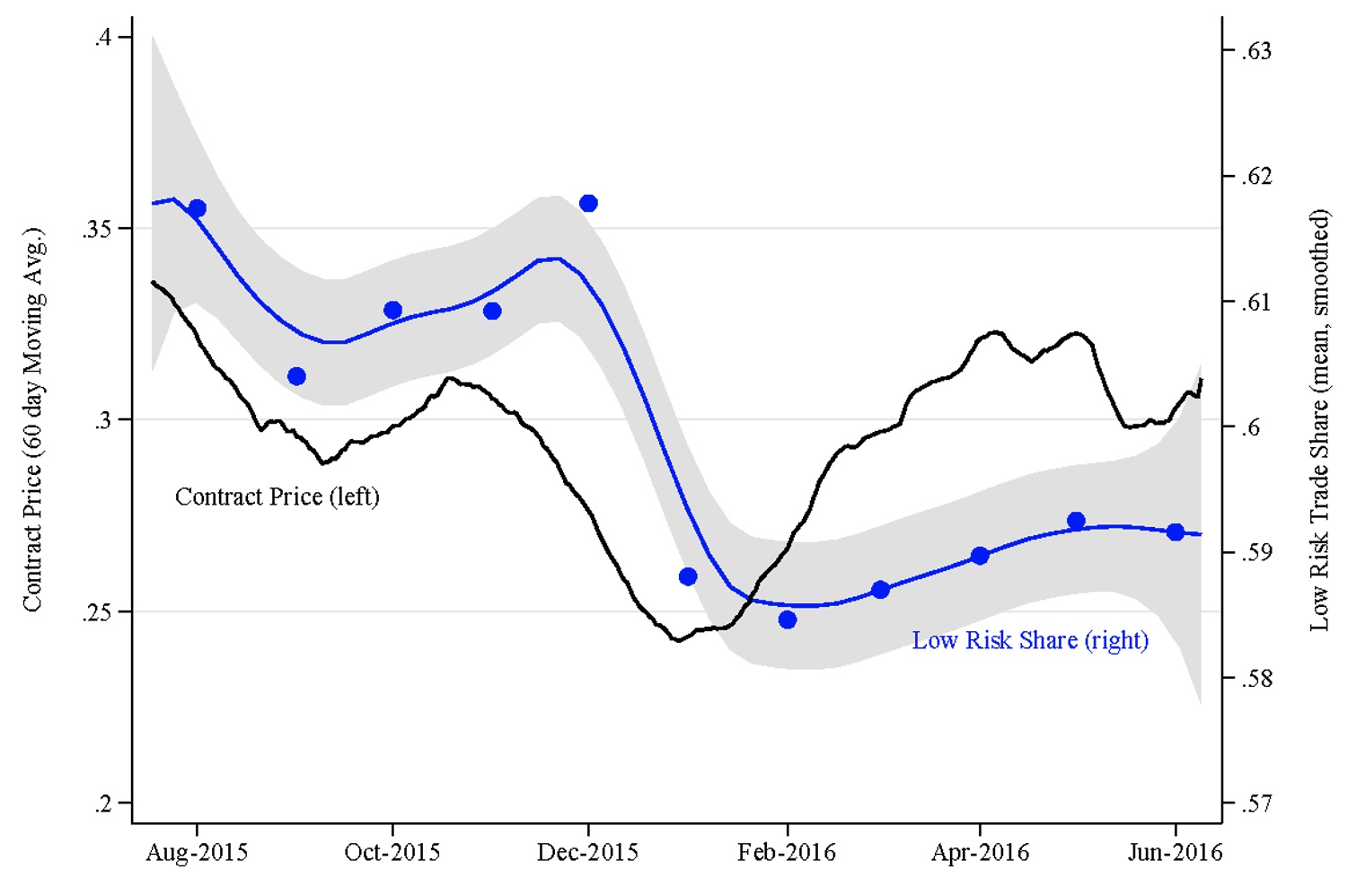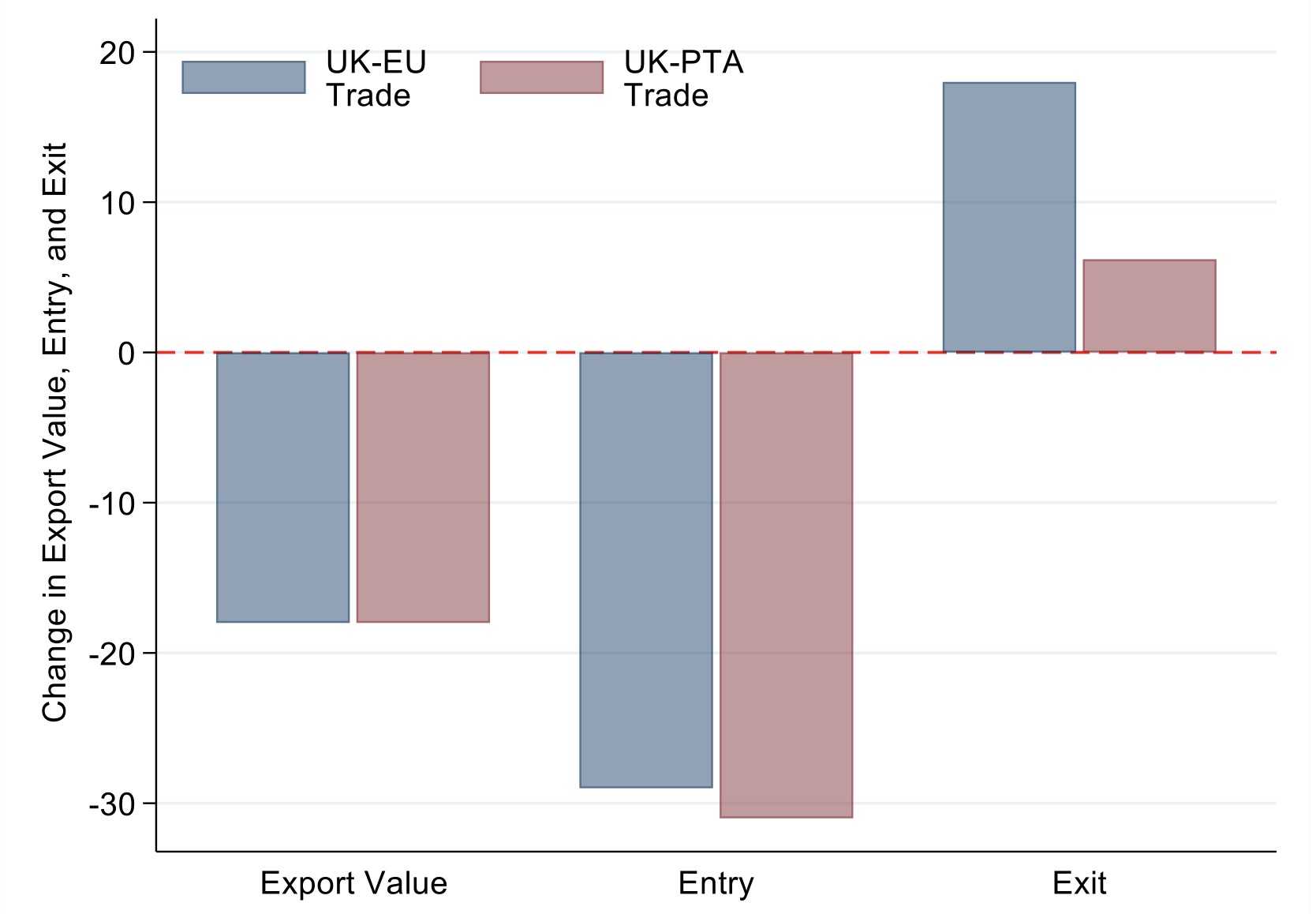Following the Brexit referendum five years ago, firms in the UK and also those in the EU and other countries operated in an environment with increased uncertainty over future trade policies. This column presents evidence of the detrimental effects of this uncertainty on trade in the UK before any changes to trade policy had taken place.
Studying the
period after the Conservative Party won the general election in May 2015
until just after the Brexit referendum in June 2016, it finds that an
increasing probability of Brexit significantly reduced UK export values
and product entry, while increasing product exit.
Five years after the
Brexit referendum, research has evaluated its impact so far on UK
trade. The findings show that the ongoing Brexit uncertainty has already
reduced UK trade in goods and services before any actual policy changes
took place. This disintegration is present in UK trade, with countries
potentially affected by trade policy changes including the EU and other
UK preferential trade partners. Firms in these countries faced increased
trade policy uncertainty, leading to depressed export investments.
We discuss the
importance of policy stability and commitments, and their effects on
business decisions and investment generally (Bloom et al. 2018, 2019).
We focus on recent evidence drawn for the impact of Brexit uncertainty
on UK trade in goods and services and conclude with some policy remarks.
The role of trade policy uncertainty
Exporting generally
involves sunk investments, such as compliance with border and national
regulations, learning about demand, and setting up distribution
networks. Examples of these and other export costs have multiplied in
the media post-Brexit.1 Firms make these investments today if
the expected profit is higher now than in the future. But increases in
uncertainty raise the risk of current export investments, increasing the
option value of waiting and thus lowering current firm exports.
Trade agreements aim
to reduce trade policy uncertainty and evidence shows that in doing so
they promote integration. One example is Portugal’s accession to the EU
in 1986. Even prior to 1986 Portuguese exporters mostly faced zero
tariffs in the EU. However, this market access was uncertain since
tariffs or other barriers could be raised at any time. Handley and Limão
(2015) find that this uncertainty was eliminated post-accession,
leading to an increase in the number of Portuguese exporters and trade
even if tariffs remained constant.2 Brexit is analogous to a
reversal of this process: the UK-EU market access is becoming more
uncertain and is therefore a source of trade disintegration.
The impact of Brexit uncertainty on EU-UK trade in goods
In May 2015, the
Conservative Party won the general election after promising a referendum
on the EU membership of the UK. The Conservative government introduced
the referendum bill days after the election. For more than a year after
that, both UK and EU firms operated knowing that there was a real,
politically enabled probability of the UK leaving the EU. In June 2016,
the ‘Leave’ campaign won.
Crowley et al.
(2019) find that Brexit uncertainty reduced UK firm export participation
by comparing pre- and post-referendum firm export entry and exit. In
Graziano et al. (forthcoming), we focus on the effect of Brexit
uncertainty between the conservative election and the referendum. We
explore variation in the probability of Brexit – measured via prediction
market contracts (or polls) – and find that the higher the predicted
probability of Brexit, the lower trade. This effect is expected to be
more pronounced for riskier industries, i.e. those facing potentially
higher protection in case of a hard Brexit, as measured by the
most-favoured nation tariffs. Hence, increases in the Brexit probability
should be positively associated with the trade share of lower risk industries, as we observe in Figure 1.
Figure 1 Brexit 60-day moving average contract price and low MFN risk trade shares

Source: Graziano et al. (forthcoming)
We estimate a
structural equation relating monthly bilateral industry exports and
trade policy uncertainty, after controlling for other trade
determinants. The uncertainty measure reflects industry-specific tail
risk as well as the Brexit probability, and has a significant negative
effect on exports. Consistent with the theory, the trade policy
uncertainty (TPU) effect reduced product entry and increased exit, and
is only present in industries with significant export sunk costs.
To quantify the
average impact of the referendum on UK-EU trade, we apply the estimated
uncertainty elasticity to the implied change in the probability of
Brexit once the Leave option won the referendum. These impacts are
calculated at the average tariff risk. The implied increase in TPU due
to the referendum changed UK-EU trade as depicted in Figure 2 (-18 log
points for export values, -29% for entry, and 18% for exit).
Figure 2 Brexit referendum uncertainty impact at average MFN risk

Source: Graziano et al (2020). Export value changes in log points; entry and exit represent percent changes.
Brexit externalities beyond the EU
Brexit uncertainty
spilled over to trade between the UK and preferential partners beyond
the EU – such as South Korea, Turkey and Israel – suggesting that firms
in these countries also faced tariff risk. This implies that a
referendum that was mainly about defining UK-EU integration caused
externalities for third countries since they had preferential trade
arrangements (PTAs) with the EU. We apply the framework described above
for UK-EU trade to these other countries and find very similar effects
as shown in Figure 2....
Full paper Vox
© VoxEU.org
Key

Hover over the blue highlighted
text to view the acronym meaning

Hover
over these icons for more information

Comments:
No Comments for this Article